BSS064-06 Leading and Managing Organisation Resources Sample
Introduction
Organisational background
WeWork is a USA-based organisation which has provided products and services of co-working spaces for individuals and entrepreneurs from the day of its inception in 2010 by Adam Neuman and Miguel McCelevy. The company has grown exponentially over time while in 2019 it has consolidated its presence in over 765 locations across 38 countries supporting around 916,000 workstations where 50% of the clients are from fortune 100 companies (WeWork, 2022). The company has gained a revenue of $765 million in the first quarter of 2022 with a 7% increase from the last quarter in revenue income (referred to Appendix 1). The company is envisioned for creatingco-working environments for people as well as the companies to work together and churn the great possibilities. The company is known for delivering technology-driven flexible space solutions, community experiences and inspiring spaces through constant reimaging of the workplace environment.
Corporate governance
Corporate governance is a vital element for organisational business operation and management through direction and control where primarily the board of directors drives the corporate governance of the organisation WeWork. Audit committee, compensation Committee, nominating and corporate governance committee are driving the organisational governance through a defined charter. The governing body of WeWork consists of the chairman of the Board where the company does not separate the offices of the chairman of the board and chief executive officers and the board is free to choose its chairman for the best interest of the company. The governing body also designated a post of a lead independent director to be effective when the chairman of the board is not independent in leading the governing framework.
Leadership Structure
The leadership structure at WeWork is distributed in executive management and the board of directors which is headed by the CEO Sandip Mathrani since February 2020 that also served as the chairman of the board since March 2022. The executive management is separately led by the chief financial officer, president and chief operating officer, Chief people officer, chief legal officer, chief compliance officer, and corporate secretary. Additionally, the executive management also consists of chief corporate affairs and marketing officer, global head of real estate and president of technology and innovation (Referred to Appendix 2). Leadership and corporate governance are linked with each other where the leadership by the chairman influences the strategic decision-making through the integration of leadership on the board as well as operating teams to attain business sustainability (Cikaliuk et al., 2020).
Analysing the main challenges in WeWork
Challenges in Corporate Governance
Corporate governance is one of the crucial parts of the company and the company has faced several challenges related to corporate governance. Considering the case study, there is a lack of sustainability in the cost structure of the company due to the lack of implementation of the business model affecting the corporate governance of the company negatively. Also, the company was laying off up to 5000 employees which are one-third of all employees due to cash flow concerns. It is also evident from the case study that the company has failed to meet the expectation of the employees because of the failure of the IPO of the company which has a valuation of $40 billion. WeCo. the parent organisation of WeWork has been objected to for controversies since its involvement in Initial Public Offering (IPO) with pushback from financial markets and began losing its revenue share with a gradual decline meant of valuation (Forbes.com, 2022). According to a report, the value of WeWork was $9 billion which is a sharp drop from the $47 billion valuation from SoftBank Group in 2019 because of the failure of IPO in 2019 due to a lack of business model (Refer to Appendix 3).
In recent times, due to the pandemic Covid-19, the company also has faced severe issues in corporate governance and a 40% decline in revenue collection negatively affects the operation. Due to the failure of the IPO the company has faced negotiation issues with property owners to get out of unprofitable properties. The lack of innovative strategies within the corporate governance of the company creates complex issues for the company and increasing the number of layoffs of employee’s decreases productivity. Sivaprasad and Mathew, (2021) stated in the research that the pandemic Covid-19 becomes a crisis for the business sector national and international range and it poses threat to internal as well as external affairs for this company. On the other hand, based on Sandeep Mathrani, the reputation of WeWork was at stake with the press and deficiency within the corporate governance of the company is one of the reasons behind it. Malikov et al., (2021) articulated in the research that corporate governance focuses on different aspects such as the layoff of employees, performance, acquisition, management and so on.
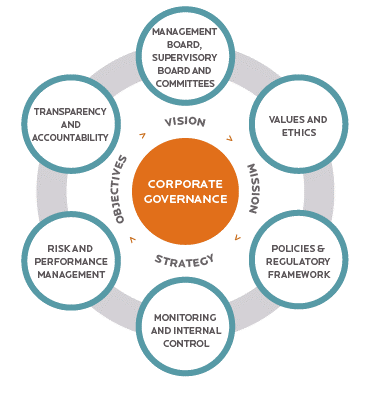
Figure 1: Corporate Governance
(Source: Malikov et al., 2021)
In recent times, Sandeep Mathrani has taken over the responsibilities of the company and implemented desirable strategies, maintaining transparency and accountability, focusing on risk and performance management and many more. Though the company has its guidelines for corporate governance, there are different boards and committees of the company which provide support to improve the corporate governance of WeWork.
Challenges in leadership
Leadership plays an important role within a company during a crisis and WeWork has faced severe leadership issues which affect the growth and progress of the company. The former CEO of the company Adam Neumann was accused of questionable corporate governance and one of the instances of the company’s failure of the company. The indecisiveness of Adam Neumann affects the company’s progress due to the failure of the IPO WeWork was facing a cash crunch and immediately approaching insolvency. Lack of proper leadership within the company propels the resignation of co-CEOs such as Artie Minson and Sebastian Gunningham which enhances the crisis for the company. There are some skills of the leaders such as collaboration, determination, passion, motivation, innovation management, work ethics and many more are required to manage changes or crises within an organisation (Aslam, 2019). The inclusion of several family members of Adam Neumann within the organisation enhances the conflict among the board members and employees whereas the person was borrowing money from the company with no interest (Refer to Appendix 4).
According to the case study, the former CEO of the company is exposed in front of the media, and press due to smoking marijuana in a private plane and this affects the reputation of the company. The absence of effective leadership fuels the debt of the company and the failure of the IPO, the unethical financial settlement with SoftBank and many more negative influences on the business. Ko et al., (2018) stated in the research that ethical leadership is appropriate in recent times and it helps to manage the crisis effectively by maintaining business ethics. Later, Sandeep Mathrani has taken over the responsibilities of the company and analysed the weak points of the company such as increasing indebtedness, lack of management, financial flaws, negative brand reputation and many more. During the failure of the IPO of the company, an extensive range of employees faced demotivation because those employees have expectations that a valuation of over $40 billion IPO may bring change among many people. On the other hand, Sandeep Mathrani shows immense confidence in the existing employees of the company instead of hiring new employees which enhances the engagement of the employees within the company. During the pandemic Covid-19, a limited pool of resources is another challenge for the leaders of the company whereas the contaminated relationship with the landlord also creates challenges in selling unprofitable properties of the company. Considering research it is quite clear that the business model of WeWork is a house of cards and there are several challenges due to rising competition and effective competitive strategies are required to maintain its existence (Birkinshaw, 2019).
Challenges in internal resource management
Internal resource management is part of organisational progress and during the pandemic Covid-19 limited resources such as financial factors, talented employees and many more. Considering the case study, Sandeep Mathrani has realised that the biggest challenge within the company is finding the problems and keeping balance the internal resources of the company. The person has revealed that there are not enough resources in every aspect which may help the company to overcome the current changes of the company. Especially, during the pandemic, limited talented employees pose a real threat to WeWork to manage the cost of the company. The current CEO of the company has only focused on existing employees instead of recruiting external employees for leadership roles. In 2021, the company merged with a company named BowX Acquisition Corp and the company is going public to bring growth and development within the company. The management of the company is thinking of transforming the company into a tech company to manage the employees of the company by selling the software of the company, WeWork Workplace. Managing human resources is highly important and Human Resource Management (HRM) includes recruitment, training, efficiency management, innovation and so on which helps the company to maintain desired productivity (Anwar and Abdullah, 2021).
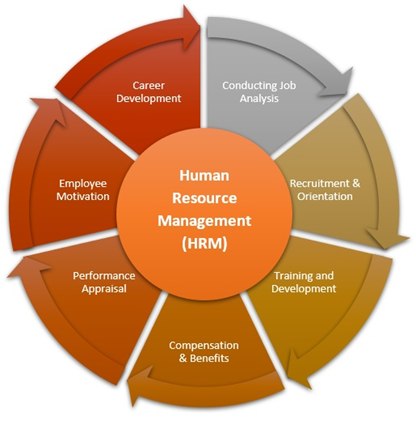
Figure 2: Human Resource Management
(Source: Anwar and Abdullah, 2021)
Lack of leadership fuels the pace of deficiencies in internal resource management and in recent times incorporation of hybrid work models may optimise the existing issues in resource management. Board meetings provide support to increase the participation of employees and the current CEO, Sandeep Mathrani is solely concerned with the future of the company. The amalgamation of digital and physical processes is highly required to mitigate the challenges of a limited pool of resources. Along with that, the incorporation of digital technologies is highly required to overcome the challenges of the company and the lack of internal resources affects the profit margin of the company in a negative way. The inclusion of different strategies such as rebuilding the reputation of the company, convincing stakeholders to stick with the family, and renegotiating leases with landlords are effective steps which may provide support in overcoming the challenges. Suh and Battaglio, (2022) stated in the research that communication is extremely important to modify the resource management of the company and there is a significant relationship between profit and internal communication within a company.
Analysing the way to improve performance and productivity through internal resource management
Performance and productivity management in WeWork
Operation management
Operation management is crucial for improving productivity through the set of activities related to redesigning workplaces for co-working environments for people as well as entrepreneurs in WeWork. Operation management in WeWork needs to be focused on product and service design, financial activities and marketing which enable the organisation to create value for the production of excellent co-working spaces and transform the inputs into outputs. The old and existing office spaces, hotel lobbies, and shopping malls, cafes are eventually transformed into office space by WeWork through the use of hardware and software in accessing office inventory and optimisation of space design (Poleg, 2020).
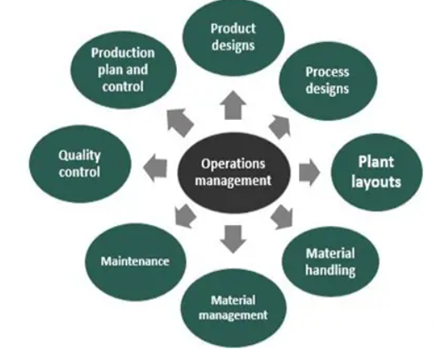
Figure 3: Operation Management
(Source: Poleg, 2020)
The operation management theory mediates the efficiency in planning, material handling, the designing process for production, maintenance and quality control in the business organisation which needs to be led by sustainable leadership and makes room to achieve sustainable competitive advantage. Operation management theory works to effectively improve the business process, efficiency in employee management, and reduction of waste from the business environment by decision-making on active areas of business operations. Planning, scheduling, design, quality management and choosing strategic locations as well as capturing investment, supply and inventory management in WeWork need to focus on improving its operation management. Leadership and corporate governance structure widely manipulated the business operation in the organisation and the sustainable direction given by the leadership paves the way to achieve sustainable management of operations at WeWork.
Performance management
Performance management is inevitable for organisational success and WeWork needs to concentrate on improving the employee as well as organisational performance through effective alignment of its resources to improve productivity and satisfy the clients through better market transactions. Performance management in the organisation is critically evaluated through the intersection of stakeholder theory and paradox theory in addressing the stakeholder’s interests through a business operation where paradox theory focuses on the challenges in addressing the conflicting interests of the stakeholders (Pinto, 2019). Performance management is critically parted into goal setting, mid-year evaluation, year-end evaluation and recognition of best performer where WeWork need to set the organisational business goal and communicate with employees as well as line managers to coordinate employee performance.
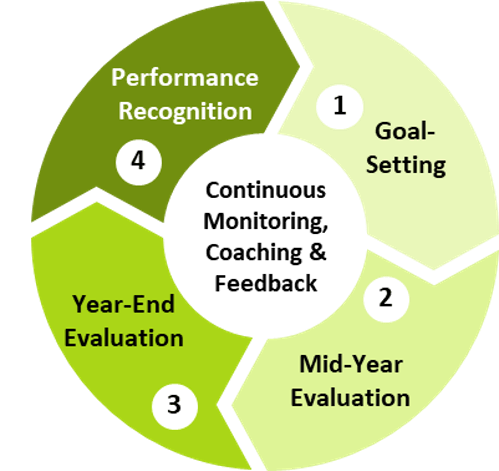
Figure 4: Performance management
(Source: Pinto, 2019)
It may be argued that employees, suppliers, customers, investors and communities are the significant stakeholders of WeWork and it needs to create value for its stakeholders through close engagement, communication, empathy, interoperability and motivation to achieve high performance. The goal-setting theory and expectancy theory are two efficient theories which need to be actualised in the business management of WeWork to execute better performance in creating and designing the co-working spaces by combining the hardware and software for a next-generation working environment. The typical performance management process indulged in competency modelling, goal setting, cascading goals, behaviour and result evaluation and implementation, which mediates the large-scale experimentation and innovation practice for simple and cost-effective strategies in performance management (Pulakos et al., 2019).
Managing decision-making through technological intervention
Decision-making has high significance in improving the performance and productivity of WeWork and that will be achieved through sustainable leadership directions and influence to attain sustainability. The age of technological emergence gave a greater degree of information and needs to be adopted by WeWork for making decisions on behalf of organisational performance and productivity. Technological intervention in terms of automation, Big Data Analytics (BDA), machine learning, AI and the Internet of Things (IoT) are suitable to adopt and intervene for data-driven decision-making to actualise better business performance at WeWork. On a specific note, a cyber-physical, multi-agent system is better to monitor and feed the prefiltering process for building management where different algorithms are combined to achieve a better degree of decision-making (Gomes et al., 2020). WeWork has taken the effective decision of a hybrid working environment amidst the Covid-19 outbreak and consistently enabling high performance by the employees and generating high productivity in the organisation. The company needs to adopt better communication through technological interfaces in ensuring organisational productivity through data-driven decision-making through sustainable leadership development.
Improving the resource management at WeWork
Evaluating power and politics within the internal environment
Organisational power and politics are an effective part of resource management where power may be of coercive, remunerative, knowledge and normative types which led to influence in organisational politics. Organisational politics in WeWork need to be legitimised through the interest of the organisation which will be maximised to resolve the uncertainty, secrecy and conflict over goals. Knowledge Management also made positive decisions for employee safety and security with hybrid work culture and cost cutting through restructuring the organisation, employee layoffs and trust building with the employees, key tenets as well negotiating with property owners. Broadly political ploys are understood through reason, friendliness, coalition, assertiveness, bargaining, higher authority and sanctions to achieve the shared commitment for the organisation or to maximise one’s power in the organisation for gaining more control over the organisation. Employee voices are important for the organisation which encompasses the working process, working environment, payments, policies and procedures and are garnered through the individual or collective forms which is a kind of political process within the organisation (Wilkinson et al., 2020). Therefore, WeWork needs to integrate the employee voices through its organisational power and politics respective to Human Resource Management (HRM), industrial relations and organisational behaviour. Usually, employee voices are the expression of workforce interest which paves for the self-determination of employees for better organisational power and politics.
Organisational culture
Organisational culture has a high impact on resource management through mediating the intra-organisational engagement and ethical code of conduct to maximise employee motivation through the perspectives of integrationist, differentiation culture. Hofstede’s cultural dimensions are closely linked with organisational culture as of USA’s national culture reflects through optimising the available human resources. It may be argued that the cultural dimensions of Hofstede’s power distance, masculinity, long-term orientation and uncertainty avoidance positively mediate the innovation practice at the organisation (Gallego and Pucheta, 2021). An effective organisational culture also mediates and maximise the utilisation of organisational resources such as finance, assets and Human talents for organisational efficiency.
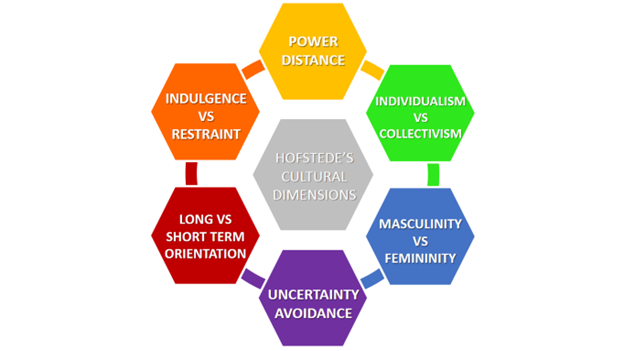
Figure 5: Hofstede’s cultural dimension
(Source: Gallego and Pucheta, 2021)
The organisational culture at WeWork needs to be focused on better talent management practices through salaries, recognition, rewards, motivations, empathy and an ethical code of conduct to clear the discriminatory atmosphere in the working environment. In addition to that, the creation of a talent management pool needs to be inclusive to develop future leaders to confidently lead the organisation during a crisis with greater knowledge management with organisational competency and resources. Organisational culture defines the intra, inter-relationship, and engagement for the organisation where employees feel belongingness and satisfaction by exercising duties and responsibilities.
Managing change
Change management in WeWork was essential after the stepping down of the former CEO and irregularities in the corporate governance and is obvious for actualising the resource management for organisation business operation to drive high performance and productivity. Lewin’s change management model is quite a simple and effective framework for humanising change management in WeWork in thoroughly detailing the account of uncertainty and resistance to change which may be experienced by all the staff levels in the organisation. The evaluation of change management is better reflected through the cognitive and behavioural development of organisational resources with positive attitudes towards the changes in managerial influence, workplace constraints and tradition (Rosdiana and Aslami, 2022).
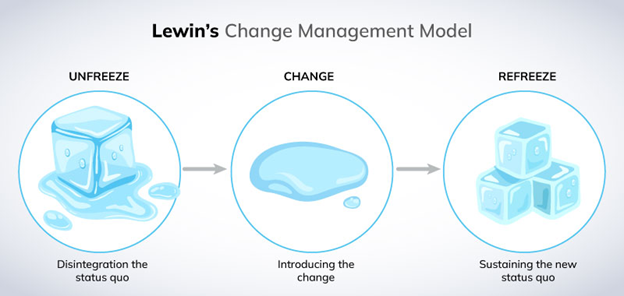
Figure 6: Lewin’s change management model
(Source: Rosdiana and Aslami, 2022)
It may be argued that WeWork needs to coordinate change management through the steps of unfreeze, change and refreeze as well as engage in communicating the change through resolving the uncertainty and resistance. The unfreezing phase is need of disintegrating the existing management style and incorporating the change in the next step and then refreezing to sustain the change in the organisation.
Conclusion and recommendations
Conclusion
It may be concluded that WeWork has done positive business management before the corporate scandals and leadership backlashes grappling it with financial indebtedness and under the current CEO, it is reinvigorating the operation through cost cutting, employee management and client satisfaction. The corporate governance framework of the organisation has sought independent leadership in delivering effective business decisions to bring the best performance and productivity to the organisation. Talent management and the development of sustainable leadership have been prioritised for organising the business operation significantly for managing resources and improving the performance and productivity of the firm. Corporate governance needs to be focused to uphold the stakeholder’s interest and engage with the market operation with improved performance and productivity to earn a positive return on investment. The company needs to focus on the parameters of performance evaluation by intersecting the stakeholder theory and paradox theory to better focus on sustainable competitive advantage. The organisational culture and data-driven decision-making are influential to achieve the desired business result to evolve with technological intervention in reflecting the positive business operation.
Recommendations
Short term
The short-term recommendations are as follows:-
- WeWork should adopt the technology-driven innovation practice in operation management to deliver unique and integrated co-working spaces to satisfy its global client for high return on profit
- WeWork should incorporate the circular management style to develop strong and centralised leadership supporting communication and collaboration across the business division to encourage the shared purpose on decision-making and resource sharing
- WeWork should engage in employee training and skill development to deliver technology-driven business processes to the global client
- The company should adopt a strong corporate governance framework and charter to eliminate further fraud and mismanagement of funds and allocate resources for business development
Technology-driven innovation practices are useful to develop unique and integrated working spaces for businesses and homes featuring state-of-the-art facilities with better customisation for the clients to generate high market demand for its product and services in co-working spaces. Further, the institutionalisation of knowledge management in the co-working spaces promotes inter-domain knowledge sharing and learning with advanced cognitive proximity (Bouncken and Aslam, 2019). Circular management style is obvious for the organisation to engage in a strong management style for managing people as well as cost cutting through the reduction of unnecessary waste as well as the development of sustainability (Viles et al., 2022).
Mid-term (1-3 years)
The mid-term recommendations are as follows:-
- WeWork should develop an inclusive talent management practice to develop business competency through its sustainable leaders in delivering successful business operations through crisis
- The company should strengthen its relationship with financial institutions, investors, suppliers and property owners through close communication to develop stakeholder confidence in the business process and operation
- The company should focus on internal auditing with a 360-degree performance evaluation approach for better resource management and accountability of the organisation to successfully achieve business growth.
Inclusive talent management is helpful for organisational business operations where own employees have bestowed the leadership role and act effectively through prior knowledge and experiences about organisational strengths and weaknesses in delivering high business growth (Fang et al., 2020). It also positively mediates the talent retention of the organisation and enables high effectiveness through increased performance and productivity. Internal auditing with a 360-degree performance evaluation approach will further strengthen the organisational key performances in every dimension by focusing on overall complexity and scope (Motubatse, 2018).
References
Anwar, G. and Abdullah, N.N., 2021. The impact of Human resource management practice on Organizational performance. International journal of Engineering, Business and Management (IJEBM), 5.
Aslam, M., 2019. Leadership challenges and issues facing academic libraries. Library Philosophy and Practice, pp.0_1-28.
Birkinshaw, J., 2019. Ecosystem businesses are changing the rules of strategy. Harvard Business Review, 8, pp.1-7.
Bouncken, R. and Aslam, M.M., 2019. Understanding knowledge exchange processes among diverse users of coworking-spaces. Journal of Knowledge Management.
Cikaliuk, M., Eraković, L., Jackson, B., Noonan, C. and Watson, S., 2020. Corporate Governance and Leadership: The Board as the Nexus of Leadership-in-Governance. Cambridge University Press.
Fang, Y.C., Chen, J.Y., Zhang, X.D., Dai, X.X. and Tsai, F.S., 2020. The impact of inclusive talent development model on turnover intention of new generation employees: the mediation of work passion. International Journal of Environmental Research and Public Health, 17(17), p.6054.
Forbes.com, 2022. (2021) WeWork and the value of effective governance, Forbes. Forbes Magazine. Available at: https://www.forbes.com/sites/michaelperegrine/2019/09/17/wework-and-the-value-of-effective-governance/?sh=3bcfd2b164ea (Accessed: October 28, 2022).
Gallego-Álvarez, I. and Pucheta-Martínez, M.C., 2021. Hofstede’s cultural dimensions and R&D intensity as an innovation strategy: a view from different institutional contexts. Eurasian Business Review, 11(2), pp.191-220.
Gomes, L., Almeida, C. and Vale, Z., 2020. Recommendation of workplaces in a coworking building: a cyber-physical approach supported by a context-aware multi-agent system. Sensors, 20(12), p.3597.
Ko, C., Ma, J., Bartnik, R., Haney, M.H. and Kang, M., 2018. Ethical leadership: An integrative review and future research agenda. Ethics &Behavior, 28(2), pp.104-132.
Malikov, K., Demirbag, M., Kuvandikov, A. and Manson, S., 2021. Workforce reductions and post-merger operating performance: The role of corporate governance. Journal of Business Research, 122, pp.109-120.
Motubatse, K.N., 2018. Audit committee evaluation in South Africa’s public sector: the 360-degree approach. International Conference on Public Administration and Development Alternatives.
Pinto, J., 2019. Key to effective organizational performance management lies at the intersection of paradox theory and stakeholder theory. International Journal of Management Reviews, 21(2), pp.185-208.
Poleg, D., 2020. Office Landlords in the Twenty-First Century. In Rethinking Real Estate (pp. 97-104). Palgrave Macmillan, Cham.
Pulakos, E.D., Mueller-Hanson, R. and Arad, S., 2019. The evolution of performance management: Searching for value. Annual Review of Organizational Psychology and Organizational Behavior, 6, pp.249-271.
Rosdiana, N. and Aslami, N., 2022. The Main Models of Change Management in Kurt Lewin’s Thinking. JurnalAkuntansi, ManajemendanBisnis Digital, 1(2), pp.251-256.
Sivaprasad, S. and Mathew, S., 2021. Corporate governance practices and the pandemic crisis: UK evidence. Corporate Governance: The international journal of business in society.
Suh, J. and Battaglio, P., 2022. Assessing the mediating effect of internal communication on strategic human resource management and perceived performance: An intersectoral comparison. Review of Public Personnel Administration, 42(3), pp.464-491.
Viles, E., Kalemkerian, F., Garza-Reyes, J.A., Antony, J. and Santos, J., 2022. Theorizing the Principles of Sustainable Production in the context of Circular Economy and Industry 4.0. Sustainable Production and Consumption, 33, pp.1043-1058.
WeWork, 2022. WeWork reports first quarter 2022 results, exceeding revenue guidance (no date) WeWork. Available at: https://investors.wework.com/news-and-events/press-releases/financial-releases-details/2022/WeWork-Reports-First-Quarter-2022-Results-Exceeding-Revenue-Guidance/default.aspx (Accessed: October 28, 2022).
Wilkinson, A., Barry, M. and Morrison, E., 2020. Toward an integration of research on employee voice. Human Resource Management Review, 30(1).
Know more about UniqueSubmission’s other writing services:

